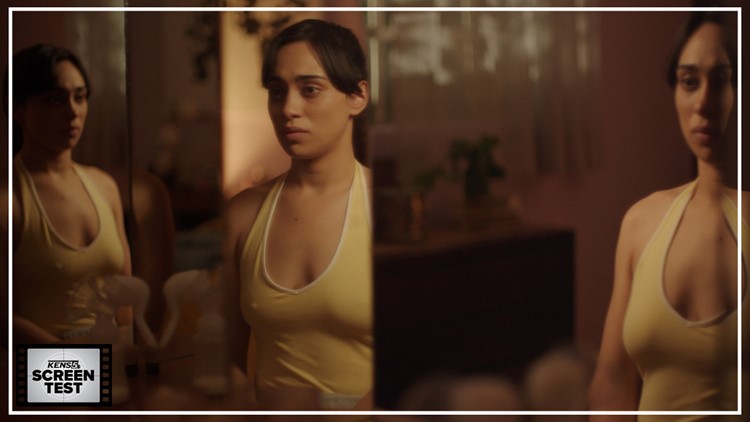TEXAS, USA — Valeria is delighted. Or so she says.
But an unmistakable ambivalence lurks behind the eyes of the young woman who has just learned she’s going to have a child. Even before the news is confirmed, Valeria (played by Natalia Solián, sporting a stark gaze) appears as if motherhood has already turned her into a phantom of her own circumstances—her eyes are darkened, her skin is ghostly-white, her long black hair drapes her like a cursed veil. As the tortured soul anchoring the maternal anxieties of “Huesera,” Valeria tries hard to overcome her reputation as someone who’s never been all that enthusiastic around kids, as she shops for cribs and visits the doctor to ensure all is as it should be.
Yet nothing really is, even as those around her offer their congratulations and well wishes. Valeria’s doubts seem to be festering from within, as if motherhood is more an anvil-weighted expectation rather than a journey she’s long waited to embark on. The creepy-crawly specters taunting her would appear to confirm it, and unfortunately for her there’s no drug that can be prescribed when one is being stalked by impish shattered-glass doppelgangers who refuse to be beaten down.
“Huesera,” a fitfully terrifying and skillfully sinister movie screening at Fantastic Fest this weekend, carves a moody path through the grown-over terrain of cinema’s pregnant-and-paranoid subgenre. Polanski’s “Rosemary’s Baby” might still be the best movie of its kind thanks to the pure wandering-through-a-nightmare virtuosity of its filmmaking. But continuously evolving – and increasingly global – conversations about motherhood and women's autonomy have ensured that thematic ground remains fertile, to say nothing of the entirely new lens through which to see these stories as female filmmakers are given more opportunities to tell them.
Enter Michelle Garza Cervera, a Mexican filmmaker with fierce new insights about what is definitively lost in the name of what could only possibly be gained on the road to motherhood. Less a political outcry than a lament about society’s most conservative convictions, her feature debut (which she cowrote with Abia Castillo) is predictable in its narrative beats but memorably cacophonous, a sensation established in a surreal opening sequence in which what sounds like gunfire forms the aural backdrop of a somber religious pilgrimage. Over the next 90 minutes, the movie’s center of gravity becomes increasingly destabilized, mirroring Valeria’s plight.
That plight, “Huesera” shows, is by no means a fantastical one, but rather rooted in contemporary struggles of identity. Cervera’s got the stuff for thrilling peer-through-your-fingers dread, but the way she visualizes Valeria’s apprehensions will be nothing particularly novel for seasoned horror fans, nor will many be surprised when they infect her relationship with her husband.
Fortunately Cervera doesn’t take her movie’s crunchy sound design and creepy anticipation for granted; just when you think "Huesera" will settle into a familiar rhythm it jolts to the past, becoming something far more intensely personal while identifying a whole new set of stakes for Valeria—ones that go far beyond the question of how scary or dangerous her demons are. With the sledgehammer force of anti-authority sentiment (and a healthy dose of rebellion to shatter adulthood's domestic pleasantries) “Huesera” opens up by drilling down to its most human concerns.
Suddenly, Valeria isn’t entirely who she presents herself to be. Suddenly, “Huesera’s” chief horrors are not ghouls but the possibility that she’ll lose herself entirely for the sake of a life she doesn’t want. Cervera and Castillo effectively create a new dimension for their lead character, in the process giving their movie a leg up on similar stories that make do with externalizing societal terrors without providing context for what shape they take. It complicates Valeria, and might even help explain why she’d rather prepare for her baby girl’s arrival with her own hands rather than accepting an eager mother-in-law’s charity.
What’s less certain is how we’re meant to square “Huesera's” enriched character textures with its supernatural detours; detours that get progressively more extravagant as the movie nears its end. A third-act set piece feels like Cervera tossing her name in the hat for some future “Silent Hills” adaptation, and it’s an admittedly haunting sequence that further serves to underscore the anonymity Valeria is so desperately trying to evade in the no man’s land between youth and adulthood, chaos and order. I welcomed the film’s poetic final moments, which ring with the suggestion that the forces of that latter struggle are more interchangeable than we might think.
"Huesera" is now in some theaters and will be available to stream on Shudder starting Feb. 17.
Starring Natalia Solián, Alfonso Dosal, Mayra Batalla, Sonia Couch.
Directed by Michelle Garza Cervera; written by Cervera and Abia Castillo
---
MORE REVIEWS:
- Fantastic Fest Review: 'Unidentified Objects' infuses standard road-trip template with newfound poignancy
- Movie review: 'Don't Worry Darling'
- ‘Speak No Evil’ Review: Hell may be other people, but who decides how we get there?
- Movie review: 'The Woman King'
- Review: 'Barbarian' gleefully messes with horror customs



